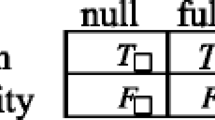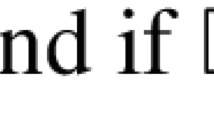Abstract
This paper develops a semantical model – theoretic account of (logical) content complementing the syntactically specified account of content developed in “A New Theory of Content I”, JPL 23: 596–620, 1994. Proofs of Completeness are given for both propositional and quantificational languages (without identity). Means for handling a quantificational language with identity are also explored. Finally, this new notion of content is compared, in respect of both logical properties and philosophical applications, to alternative partitions of the standard consequence class relation proposed by Stelzner, Schurz and Wiengartner.
Similar content being viewed by others
REFERENCES
Gemes, K. (1990): Horwich, Hempel, and hypothetico-deductivism, Philosophy of Science 57: 609–702.
Gemes, K. (1991): Content and Confirmation, Ph.D. Dissertation, University of Pittsburgh.
Gemes, K. (1993): Hypothetico-deductivism, content, and & the natural axiomatization of theories, Philosophy of Science 60: 477–487.
Gemes, K. (1994): A new theory of content, Journal of Philosophical Logics 23: 596–620.
Gemes, K. (1994a): Explanation, unification, and content, Nous 28: 225–240.
Gemes, K. (1994b): Schurz on hypothetic-deductivism, Erkenntnis 41: 171–181.
Gemes, K. (1996): Hypothetico-deductivism: the current state of play; the criteria of empirical significance: endgame, forthcoming.
Grimes, T. (1990): Truth, content and the hypothetico-deductive method, Philosophy of Science 57: 514–522.
Harris, J. (1974): Popper's definitions of ‘verisimilitude’, British Journal for the Philosophy of Science 25: 160–165.
Miller, D. W. (1974): Popper's qualitative theory of verisimilitude, British Journal for the Phisosophy of Science 25: 166–177.
Schurz, G. (1989): Relevant deduction in science and ethics. With a case study of the is-ought problem,Habilitationsschrift, Salzburg.
Schurz, G. (1991): Relevant deduction, Erkenntnis 35: 391–437.
Schurz, G. (1991b): Relevant deductive inference. In Schurz, G. and Dorn, J. (eds), Advances in Scientific Philosophy, Rodopi, Amsterdam.
Schurz, G. (1994): Relevant deduction and hypothetico-deductivism: a reply to Gemes, Erkenntnis 41: 183–188.
Stelzner, W. (1992): Relevant deontic logic, Journal of Philosophical Logic 21: 193–216.
Tichy, P. (1994): On Popper's definitions of verisimilitude, British Journal for the Philosophy of Science 25: 155–160.
Weingartner, P. and Schurz, G. (1986): Paradoxes solved by simple relevance criteria, Logique et Analyse 29: 3–40.
Weingartner, P. and Schurz, G. (1987): Verisimilitude defined by relevant consequence elements. A new reconstruction of Popper's idea. In Kuipers, T. A. (ed.), What Is Closer-To-The-Truth?, Poznan Studies in the Philosophy of Science and the Humanities, Vol. 10, Rodopi, Amsterdam.
Weingartner, P. (1988): Remarks on the consequence-class of theories. In Scheibe, E. (ed.), The Role of Experience in Science,De Gruyter, Berlin/New York.
Author information
Authors and Affiliations
Rights and permissions
About this article
Cite this article
Gemes, K. A New Theory of Content II: Model Theory and Some Alternatives. Journal of Philosophical Logic 26, 449–476 (1997). https://doi.org/10.1023/A:1004291217792
Issue Date:
DOI: https://doi.org/10.1023/A:1004291217792




